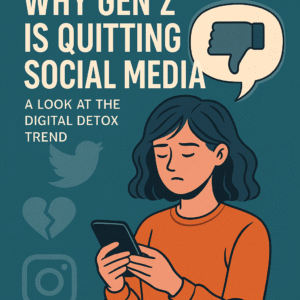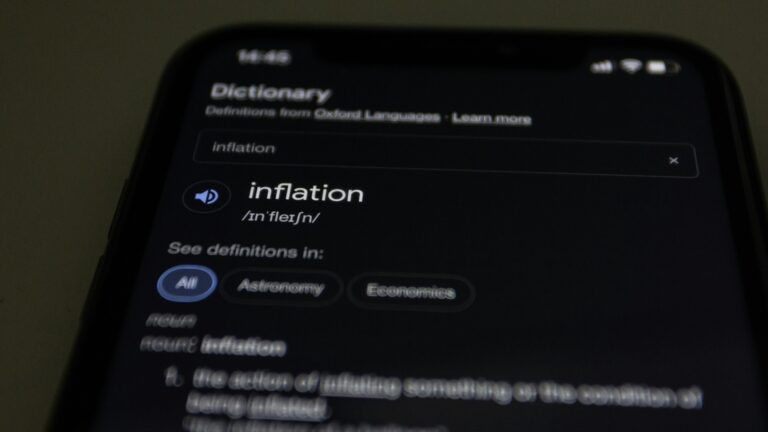
1. Introduction: The Paradox of Digital Natives
Born into an era of smartphones and social media, Generation Z (those born roughly between 1997 and 2012) is often called the first true digital-native generation. Yet in a surprising twist, they’re leading a new movement: the digital detox.
Far from being a tech rejection, this is a conscious shift toward digital well-being—a rebalancing of screen time, social media usage, and mental health. As we move through 2025, this trend reflects a deeper generational shift in how young people define success, peace, and authenticity.
2. Why Gen Z Is Choosing to Detox
🧠 Mental Health Burnout
Constant comparison through curated feeds has led to rising anxiety, depression, and body image issues among Gen Z. According to McKinsey, this generation experiences a paradox—deep digital dependence paired with emotional burnout.
They are also experiencing what psychologists call the “dopamine treadmill“—the diminishing satisfaction from constant likes and notifications. This leads to addictive behavior, restlessness, and mental fatigue.
😴 Sleep Disruption & FOMO
Blue light from screens disrupts melatonin production, affecting sleep. Meanwhile, FOMO (Fear of Missing Out) drives late-night scrolling, increasing stress and affecting overall health.
⚠️ Information Overload & Doomscrolling
Gen Z spends around 9 hours per day on screens (Common Sense Media), often exposed to misinformation and negative news. The phenomenon of doomscrolling—compulsively consuming negative content—has been linked to increased anxiety.
🔒 Privacy Concerns
Concerns about data tracking, algorithmic manipulation, and surveillance have made Gen Z more privacy-conscious. The rise in targeted ads and curated feeds makes them feel monitored and overwhelmed.
❤️ Desire for Real-Life Connection
Despite being hyper-connected, many Gen Zers feel isolated. They crave authentic in-person experiences and offline relationships, believing these bring more satisfaction than virtual likes.
3. How Gen Z Is Detoxing
Here are the most popular digital detox strategies Gen Z is adopting in 2025:
- Deleting or disabling social media apps, either temporarily or permanently.
- Using built-in tools like Digital Wellbeing (Android) and Screen Time (iOS) to set app limits or restrict night-time use.
- Turning phones to grayscale or monochrome mode to make them less addictive.
- Switching to “dumb phones” on weekends or while studying. Nokia’s minimalist phones are gaining popularity.
- Creating digital-free zones (e.g., bedrooms) or tech-free hours like “no screens after 9 PM.”
- Prioritizing offline hobbies like reading, journaling, art, cooking, or volunteering.
- Participating in detox retreats or silent camps, some of which are organized by wellness startups such as Unplugged in the UK.
- Trying notification blackout periods, which research from Harvard Business Review shows can improve focus and emotional stability.
4. Benefits vs. Challenges
| Benefits | Challenges |
|---|---|
| Improved sleep, reduced anxiety, less FOMO | Withdrawal symptoms like irritability or loneliness |
| Better focus and academic productivity | Feeling disconnected from friends or pop culture |
| Stronger real-life relationships | Struggle to reintegrate after detox |
| More self-awareness and creativity | Fear of missing updates or job-related info |
| Reduced digital clutter and distraction | Peer pressure to “stay online” for validation |
In a 2025 ET x Snapchat Gen Z Index, over 84% of Indian Gen Z respondents expressed a desire to limit screen time and lead a more balanced lifestyle. 26% had already attempted or completed a digital detox.
5. Why This Matters: Broader Implications in 2025
🧑💻 Tech Shifts
Tech companies like Apple and Google are integrating digital wellness tools, not just engagement boosters. Apple’s Screen Time and Google’s Digital Wellbeing are now core OS features.
📣 Marketing Reimagined
Brands must rethink how they connect with Gen Z, especially if they’re spending less time on social media. Real-world experiences and authenticity matter more than flashy online ads.
🎓 Educational Reform
Schools are beginning to include digital literacy and wellness programs to help students set healthy tech boundaries.
👨👩👧👦 Influence on Younger Generations
Gen Z’s behavior is influencing Gen Alpha and even parents, reshaping family discussions around screen time and healthy online habits.
🌐 Rise of Conscious Tech Use
This generation is defining what it means to be a mindful digital citizen, focusing on intentional tech usage over impulsive consumption.
6. Conclusion: Not Rejecting Tech—Reclaiming It
The Gen Z digital detox trend isn’t about rejecting the internet or smartphones—it’s about regaining control in a hyper-connected world. By choosing how and when they engage, Gen Z is setting a new precedent for mental health, focus, and authentic living.
As tech platforms, marketers, and institutions adapt, Gen Z’s choices may help redefine the future of digital interaction—centered not on constant connectivity, but conscious connection.
7. Sources & References
- McKinsey: Gen Z Lives Online
- Common Sense Media: Teens and Screens 2024
- Harvard Business Review: What Happens When You Turn Off Notifications
- ET x Snapchat Gen Z Index Report
- Unplugged Digital Detox Retreats
- Nokia’s Feature Phones
- Apple Screen Time
- Google Digital Wellbeing
8. About the Author
Sandeep, writing for the Pulsewire Editorial Team, is a digital culture analyst exploring how technology shapes mental health, generational behavior, and lifestyle trends. He specializes in Gen Z tech habits, digital wellness, and conscious tech use.









